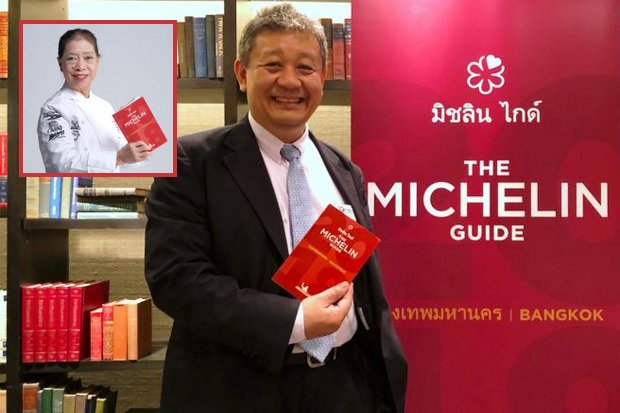
The invitation was for a black-tie dinner, which makes people like me think twice about attending, but then it was for something that I am passionate about -- food. The invite was sent weeks ahead of the announcement of Thailand's launch of the <i>Michelin Guide Bangkok</i>.
The first disappointment came when the list of Michelin stars was announced on Wednesday afternoon. Only one establishment selling street food, Jay Fai, managed to get a star. At the gala dinner the host announced that for Michelin to give a star, one of the criteria is for vendors to have a fixed location and not be on a cart. The hugely popular chicken rice at Pratunam and Tipsamai Pad Thai near the Golden Mount have fixed locations, but alas they were not to make it.
What was more surprising to me was the fact that only seven out of the 17 establishments that won a star were serving Thai food. Five restaurants, including one that won two stars, serve French cuisine. As a fan of Thai food, that was one of the biggest disappointments.

Umesh Pandey is Editor, Bangkok Post.
In the search for the truth behind the lack of awards for Thai food, I had to go and find out what had ticked the judges' boxes. After all, the squeaky-clean military government had decided to spend 144 million baht of my hard-earned tax money to undertake work on the Michelin Guide Bangkok.
As it turned out, a simple Google search yielded results that would surprise most of us. It showed that the judges love "contemporary" food. The other word often used by Michelin is "innovative" or what is also called "fusion" -- something that I and many more people call "confusion" because it confuses the diner about what kind of food they are eating.
Nearly half the restaurants (including some Thai restaurants) that won a star turned out to be what Michelin calls "contemporary" and/or "innovative". And if one searches for other countries such as Singapore, Hong Kong and others, one will see that the number of restaurants that are under these two categories account for the bulk of the stars given out.
In Singapore for example, out of the 38 restaurants that have ratings of one to three stars, only 10 are Chinese/Cantonese, one is Indian and 15 are serving French/European and other "contemporary" food.
Hong Kong and Macau, which house 81 establishments with one to three stars, have a similar distribution, although the saving grace in Hong Kong is that 35 out of the 57 restaurants in the one-star category are Chinese/Cantonese, while eight out of the 16 two-star establishments are serving local food. And in the three-star category, two out of the eight venues are serving Chinese dishes.
But what is more interesting is that a branch of the France-based L'atelier de Joel Robuchon in Hong Kong has a three-star rating and so does its sister establishment in Macau. The L'atelier de Joel Robuchon mother ship in Paris is rated as one of the best 100 restaurants in the world and it seems all its other outlets around the world, including the one in Bangkok, keep winning much-hyped Michelin stars.
Setting aside the facts of how restaurant chains are winning awards and how "contemporary" and "innovative" restaurants are making the Michelin lists in each country, I wonder what the Ministry of Tourism and Sports will achieve from this expense of 144 million baht?
Foreigners who come to Thailand always go to these same restaurants anyway and none of the names except Jay Fai was any surprise to anyone in the eatery loop of this city. People come here to eat Thai food, not French or other "contemporary" cuisines that can be found anywhere in the world.
Why does a city have to hire Michelin and pay so much to get stars? What does the city achieve from this exercise and can I as a heavy taxpayer ask for the returns from this exercise?
The Ministry of Tourism and Sports may say that this will increase tourist numbers into the country, but is that a new thing? Tourist numbers are expected to hit 34 million this year from 32 million last year and less than 30 million the year before that. So can we safely say that next year, because of the 144 million baht spent, we will see 35 million or more tourists who will spend more money to increase tourism income by double digits?
To end it all, the six-course gala dinner on Wednesday failed to give us a taste of the real heroine of the day -- Jay Fai.
